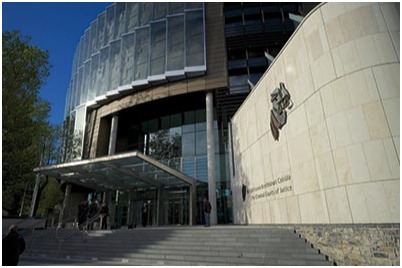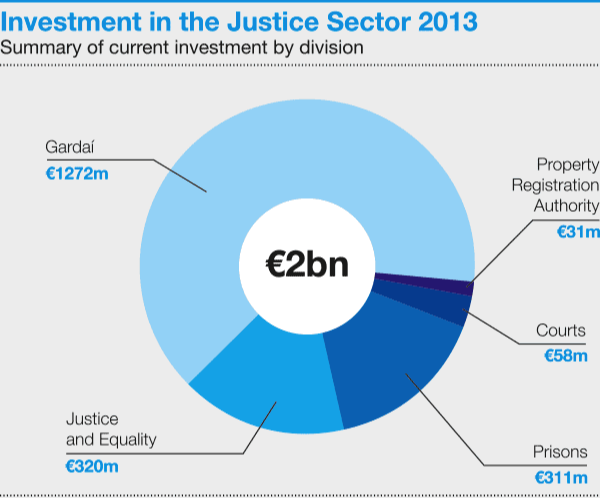Public Service Reform Plan 2014-2016
3.5 Justice and Equality Sector

The remit of the Justice family of agencies and services stretches across a range of human concerns and touches on aspects of national life as diverse as the protection of life and property; the prevention and detection of crime; the operation of the probation, youth justice and prison services; the maintenance and promotion of fairness and equality; the provision of services for the buying and selling of property; the management of inward migration to the State; and providing a Courts Service and other forms of investigative tribunals.
Reform is needed in the Justice and Equality sector so that it will continue to have the capacity to deliver services with maximum efficiency and effectiveness and be able to respond to the challenges facing it in the future in the context of emerging demographic and social changes and significantly reduced budgets.
To address this, the Minister for Justice and Equality is driving the implementation of an ambitious system-wide reform programme, informed by the key principles that:
[i] the citizen and service user must be the key focus;
[ii] value for money is paramount;
[iii] the use of ICT is optimised; and
[iv] shared services and common approaches are utilised wherever advantageous.
Under this programme, which is underpinned by a very significant programme of legislative reform, the organisations across the sector are reforming their models of service delivery, in partnership with each other, concentrating on the front-line and working together in new ways to prevent crime, reduce re-offending, enable more secure communities, advance the security of the State, achieve a more equitable and inclusive society and fair, effective, efficient and accessible justice systems.
The key reform priorities for the sector in the short to medium term are:
[i] Tackling Crime: a White Paper on Crime (incorporating a National Anti-Crime Strategy), to be published in 2014, outlines a strategy and sets priorities to tackle crime in the period to 2018. The Department will work towards improving the coordination of activities and processes across the criminal justice system in order to use resources to best effect and to get the best outcomes for members of the public and victims. A Criminal Justice Strategic Committee will be established to support integration in the context of this strategy in 2014;
The Prison Service is working closely with the Courts Service to develop more efficient operating models, including the increased use of video link technology.

[iii] Fairness and equality: integration of the Equality Authority and Human Rights Commission on an administrative basis to establish the new Irish Human Rights and Equality Commission (IHREC) has commenced, pending publication and enactment of the necessary legislation by mid-2014. The new Commission will strengthen Ireland’s Human Rights and Equality infrastructure. The Legal Aid Board is prioritising initiatives to provide early legal advice and an integrated family mediation initiative to reduce demand for litigation in family law cases;
Gardaí will deliver an additional 61,000 patrol hours in 2013.
[iv] Immigration: the delivery of immigration services will be reformed over the period of this Plan with the aim of delivering improved, more efficient immigration services at significantly reduced costs by utilising civilian staff, thereby releasing Gardaí for operational duties. In addition, a range of initiatives to promote economic activity and inward investment will be implemented. These include the Entrepreneurs and Investors Programmes and the introduction of reciprocal visa arrangements within the Common Travel Area to promote increased tourist numbers from the emerging economies; and
[v] Legislative programme: the criminal and civil law structures and systems – including family law and court structures – are being updated so that Ireland’s laws and procedures reflect the current needs of society. Many of these new laws are key enablers of reform. For example, new legislation covering the exercise of decision making powers by people with impaired capacity was published in July 2013, legislation providing for a DNA database which will assist the Garda Síochána in tackling crime was published in September 2013 and the legislation governing reform of legal services is before the Oireachtas.
A modern, effective and responsive Justice and Equality system, based on the Rule of Law, is essential to democracy, to the creation of a more equitable society and to economic progress. These reforms will ensure that the services that make up the Justice and Equality Sector will continue to have the capacity and capability to perform this vital function, with visibility in our communities, prioritising personal safety and security, and promoting access to Justice, based on efficient use of resources in a framework of human rights.
[v] Legislative programme: the criminal and civil law structures and systems – including family law and court structures – are being updated so that Ireland’s laws and procedures reflect the current needs of society. Many of these new laws are key enablers of reform. For example, new legislation covering the exercise of decision making powers by people with impaired capacity was published in July 2013, legislation providing for a DNA database which will assist the Garda Síochána in tackling crime was published in September 2013 and the legislation governing reform of legal services is before the Oireachtas.
A modern, effective and responsive Justice and Equality system, based on the Rule of Law, is essential to democracy, to the creation of a more equitable society and to economic progress. These reforms will ensure that the services that make up the Justice and Equality Sector will continue to have the capacity and capability to perform this vital function, with visibility in our communities, prioritising personal safety and security, and promoting access to Justice, based on efficient use of resources in a framework of human rights.
